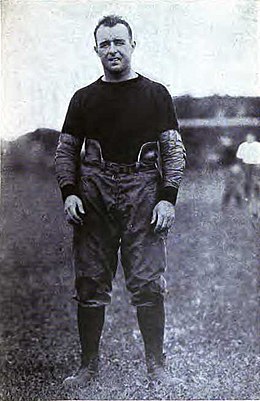Charlie Brickley
 |
|
| Date of birth | November 24, 1891 |
|---|---|
| Place of birth | Boston, Massachusetts |
| Date of death | December 28, 1949 (aged 58) |
| Place of death | New York, New York |
| Career information | |
| Position(s) | Fullback |
| Career history | |
| As coach | |
| 1915 | Johns Hopkins |
| 1916–1917 | Boston College |
| 1917 | Massillon Tigers |
| 1920 | Fordham |
| 1921 | Fordham (backfield) |
| 1921 | New York Brickley Giants |
| As player | |
| 1917 | Massillon Tigers |
| 1921 | New York Brickley Giants |
| Career highlights and awards | |
|
|
Charles Edward Brickley (November 24, 1891 – December 28, 1949) was an American football player and coach. He served as the head football coach at the Johns Hopkins University in 1915, at Boston College from 1916 to 1917, and at Fordham University in 1920 with Joseph DuMoe as co-coach, compiling a career college football record of 22–9. Brickley also coached the New York Brickley Giants of the American Professional Football Association—now the National Football League—in 1921, tallying a mark of 0–2.
Brickley was born in Boston, Massachusetts and raised in Everett, Massachusetts. He stood 5'10" and weighed 181 pounds during his athletic career.
Brickley attended Harvard College, where he played football from 1911 go 1914 for the Crimson as a fullback and placekicker under head coach Percy Haughton. He was named an All-American in 1913 and 1914. During the 1913 Harvard–Yale game, Brickley kicked all five of Harvard's field goals in the Crimson's 15–5 win over Yale. He set college football records for most field goals made by one player in a single season (13) and most career field goals (34).
Brickley also competed in the triple jump at 1912 Summer Olympics, finishing 9th. At the same Olympics he competed in the baseball event which was held as demonstration sport.
...
Wikipedia
